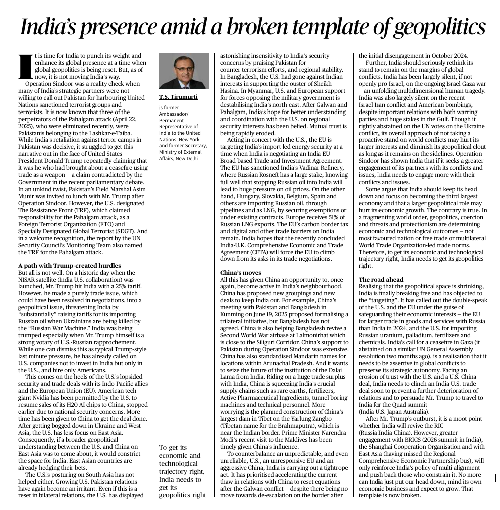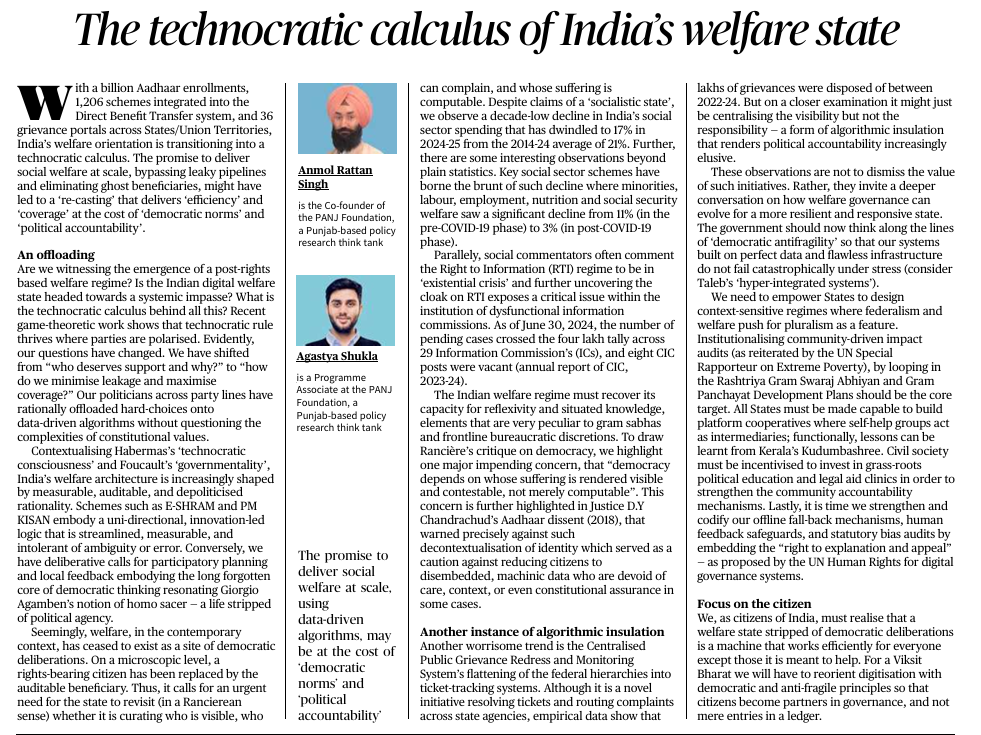Key Points
1. Context and Significance
- The article examines India’s evolving role in a volatile global order marked by disrupted norms, power rivalries, and regional instability.
- It emphasizes the changing nature of global geopolitics post-COVID, Ukraine war, and shifting alliances.
2. Global Power Flux
- The US-China strategic rivalry dominates the geopolitical narrative.
- Europe faces internal political and economic strains, limiting its global assertiveness.
- Russia’s Ukraine invasion has redefined security calculations in Europe and beyond.
3. Disruption of Multilateralism
- Traditional global governance mechanisms are weakened—UN, WTO, and climate change forums face credibility challenges.
- Multipolarity is emerging, but without a stable “template” for cooperation.
4. India’s Strategic Position
- India is pursuing a multi-alignment strategy—maintaining ties with the US, Russia, and other powers while engaging in Global South leadership.
- Hosting the G20 (2023) showcased India’s ability to broker consensus amid deep global divisions.
5. Regional & Economic Dimensions
- India navigates a challenging neighbourhood:
- China border tensions,
- Pakistan instability,
- Strategic ties with ASEAN, Middle East, and Africa.
- China border tensions,
- Economic growth, digital public infrastructure, and manufacturing push enhance India’s global attractiveness.
6. Challenges to India’s Geopolitical Role
- Energy dependence, trade imbalances, and technology gaps.
- Balancing strategic autonomy with deepening security partnerships (QUAD, I2U2, BRICS).
- Managing climate responsibilities amid development imperatives.
7. Future Outlook
- India must use economic strength, diplomatic credibility, and technological capacity to influence evolving global norms.
- Need for resilient supply chains, leadership in climate diplomacy, and strengthening defence preparedness.
Possible UPSC Mains Questions
GS Paper 2 – International Relations
“In a fragmented global order, India’s pursuit of multi-alignment has emerged as a strategic necessity. Critically examine this approach in light of recent geopolitical developments.”
Key Points
1. Context and Shift in Welfare Approach
- India’s welfare delivery is increasingly driven by digital systems and data-driven algorithms (Aadhaar integration, DBT, grievance portals).
- Shift from “Who deserves support?” to “How to minimise leakage and maximise coverage?”.
- Politicians have moved hard policy decisions into automated systems, prioritising efficiency over democratic deliberation.
2. Technocratic Calculus and Concerns
- Draws from Habermas’ technocratic consciousness and Foucault’s governmentality—focus on measurable, auditable, depoliticised rationality.
- Innovations like SE-HRAM, PM-KISAN embody an error-free, audit-friendly model, but at the cost of political agency.
- Decline in participatory forums like gram sabhas raises concerns about democratic deficit.
3. Political Accountability and Transparency
- RTI filings and CIC case backlogs highlight reduced public oversight.
- High disposal rates of grievances may indicate visibility without accountability—problems being processed but systemic issues ignored.
4. Risks of Over-Technocratisation
- Over-reliance on perfect data systems can fail under stress (Taleb’s “hyper-integrated systems”).
- Welfare governance risks losing resilience and adaptability.
- Citizens risk becoming “auditable numbers” rather than active political participants.
5. Recommendations and Way Forward
- Design context-sensitive welfare systems preserving federalism and pluralism.
- Embed community-driven impact audits and use intermediaries like self-help groups.
- Strengthen offline fallback systems, human feedback loops, and legal rights like right to explanation and appeal.
- Promote grassroots civil society engagement for accountability and education.
6. Citizen’s Role
- Public must realise that welfare is not a one-way benefit pipeline but a democratic mechanism requiring participation.
- Need to defend democratic values against excessive technocratic centralisation.
Possible UPSC Mains Questions
GS Paper 2 – Governance
“Critically examine how India’s transition towards a data-driven welfare state has impacted political accountability and democratic norms.”



